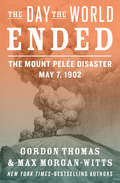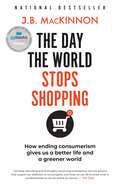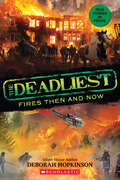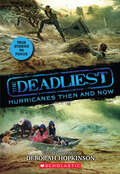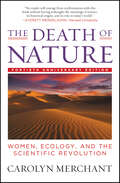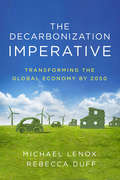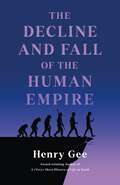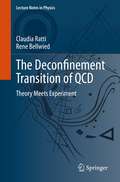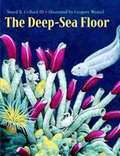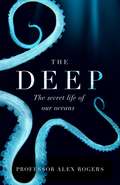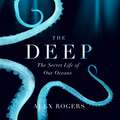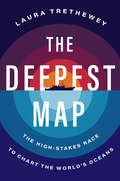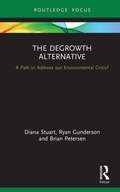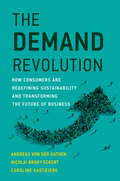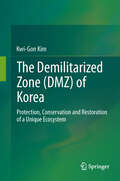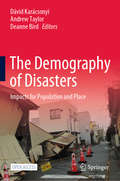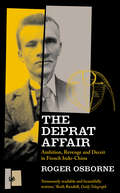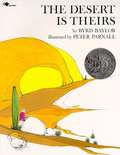- Table View
- List View
The Day It Rained Forever: The Story of the Johnstown Flood
by Virginia T. GrossWhen a cheaply constructed dam above Johnstown bursts under the onslaught of torrential rains, Christina and her family struggle to escape the floodwater which bears down upon their town.
The Day the World Ended: The Mount Pelée Disaster: May 7, 1902
by Gordon Thomas Max Morgan-WittsThe true story of a horrifying natural disaster—and the corruption that made it worse—by the New York Times–bestselling authors of Voyage of the Damned. In late April 1902, Mount Pelée, a volcano on the Caribbean island Martinique, began to wake up. It emitted clouds of ash and smoke for two weeks until violently erupting on May 8. Over 30,000 residents of St. Pierre were killed; they burned to death under rivers of hot lava and suffocated under pounds of hot ash. Only three people managed to survive: a prisoner trapped in a dungeon-like jail cell, a man on the outskirts of town, and a young girl found floating unconscious in a boat days later. So how did a town of thousands not heed the warnings of nature and local scientists, instead staying behind to perish in the onslaught of volcanic ash? Why did the newspapers publish articles assuring readers that the volcano was harmless? And why did the authorities refuse to allow the American Consul to contact Washington about the conditions? The answer lies in politics: With an election on the horizon, the political leaders of Martinique ignored the welfare of their people in order to consolidate the votes they needed to win. A gripping and informative book on the disastrous effects of a natural disaster coupled with corruption, The Day the World Ended reveals the story of a city engulfed in flames and the political leaders that chose to kill their people rather than give up their political power.
The Day the World Stops Shopping: How Ending Consumerism Saves The Environment And Ourselves
by J.B. MackinnonIn a brilliant work of imaginative non-fiction, prize-winning author J.B. MacKinnon asks what would happen--to our economy, our ecology, our products, our selves--if we stopped consuming so much? Is that alternative world one we might actually want to live in?"We can't stop shopping. And yet we must. This is the consumer dilemma." The planet says we consume too much: in North America, we burn the earth's resources at a rate five times faster than they can regenerate. And despite our efforts to "green" our consumption--by recycling, increasing energy efficiency, or using solar power--we have yet to see a decline in global carbon emissions. The economy says we must always consume more, because, as we've seen in the pandemic, even the slightest drop in spending leads to widespread unemployment, bankruptcy and home foreclosures. Addressing this paradox head-on, J.B. MacKinnon asks, What would really happen if we simply stop shopping? Is there a way to reduce our consumption to earth-saving levels without triggering an economic collapse? At first, this question took him around the world, seeking answers: from America's big-box stores, to the hunter-gatherer cultures of Namibia, to communities in Ecuador that consume at an exactly sustainable rate. Then his thought experiment came shockingly true, as the coronavirus brought shopping to a halt and MacKinnon's ideas were tested in real time. Drawing on experts ranging from economists to climate scientists to corporate CEOs, MacKinnon investigates how living with less would change our planet, our society and ourselves. Along the way, he reveals just how much we stand to gain. Imaginative and inspiring, The Day the World Stops Shopping will empower you to imagine another way.
The Dead Sea and the Jordan River
by Barbara KreigerFor centuries travelers have been drawn to the stunning and mysterious Dead Sea and Jordan River, a region which is unlike any other on earth in its religious and historical significance. In this exceptionally engaging and readable book, Barbara Kreiger chronicles the natural and human history of these storied bodies of water, drawing on accounts by travelers, pilgrims, and explorers from ancient times to the present. She conveys the blend of spiritual, touristic, and scientific motivations that have driven exploration and describes the modern exploitation of the lake and the surrounding area through mineral extraction and agriculture. Today, both lake and river are in crisis, and stewardship of these water resources is bound up with political conflicts in the region. The Dead Sea and the Jordan River combines history, literature, travelogue, and natural history in a way that makes it hard to put down.
The Deadliest Fires Then and Now (The Deadliest)
by Deborah HopkinsonPerfect for fans of I Survived and the Who Was series, and packed with graphics, photos, and facts for curious minds, this is a gripping look at the deadliest fires in American history.As the sun sank over the town of Peshtigo, Wisconsin, one warm October night in 1871, a smoky haze hung in the dry air. There had been little rain, and small fires had been rolling through town continuously since the Summer. For weeks the people had tried to protect their homes and businesses from fire. But they could not protect themselves from what would culminate in the deadliest fire in American history.As industrialization surged across the country, and Westward colonization leveled forests to build cities, fires became a mainstay in American life. And as populations grew, so too did the human toll that fire could exact. Through the nineteenth and twentieth centuries, Americans searched for new and innovative ways to combat the threat of fire. And with climate change threatening to set the whole world aflame, we are once again in a fight for our planet’s future.Through the eyes of scientists, witnesses, and survivors of terrible fires alike, Sibert Honor author Deborah Hopkinson brings the horrific history of deadly fires to life, tracing a line from the Peshtigo and Great Chicago fires of 1871 to the wildfires raging in the western United States today. Filled with more than 50 period photographs and illustrations, facts, and pull-out boxes for eager nonfiction readers.
The Deadliest Hurricanes Then and Now (The Deadliest)
by Deborah HopkinsonPerfect for fans of I Survived and the Who Was series! Packed with graphics, photos, and facts for curious minds, this is a gripping look at America's deadliest hurricane.As a hurricane gathered in the Caribbean, blue skies covered Galveston, Texas. Scientists knew a storm was coming. But none of them were able to prepare Galveston for the force of the hurricane that hit on September 8, 1900.The water from the storm surge pulled houses off their foundations, and the winds toppled telephone poles and trees like toothpicks. And amid the chaos, Galveston's residents did all they could to rescue one another.From the meteorologists tracking the storm, to the ordinary people who displayed extraordinary bravery... from the inequitable effects of the disaster, to the science of hurricanes and weather: Acclaimed Sibert Honor author Deborah Hopkinson brings voices from history to life in this fast-paced, wide-ranging narrative of the deadliest hurricane in American history. Filled with more than 50 period photographs and illustrations, charts, facts, and pull-out boxes for eager nonfiction readers.
The Death of Nature: Women, Ecology, and the Scientific Revolution
by Carolyn MerchantUPDATED 40TH ANNIVERSARY EDITION WITH 2020 PREFACEAn examination of the Scientific Revolution that shows how the mechanistic world view of modern science has sanctioned the exploitation of nature, unrestrained commercial expansion, and a new socioeconomic order that subordinates women.
The Decarbonization Imperative: Transforming the Global Economy by 2050
by Michael Lenox Rebecca DuffTime is of the essence. Climate change looms as a malignant force that will reshape our economy and society for generations to come. If we are going to avoid the worst effects of climate change, we are going to need to effectively "decarbonize" the global economy by 2050. This doesn't mean a modest, or even a drastic, improvement in fuel efficiency standards for automobiles. It means 100 percent of the cars on the road being battery-powered or powered by some other non-carbon-emitting powertrain. It means 100 percent of our global electricity needs being met by renewables and other non-carbon-emitting sources such as nuclear power. It means electrifying the global industrials sector and replacing carbon-intensive chemical processes with green alternatives, eliminating scope-one emissions—emissions in production—across all industries, particularly steel, cement, petrochemicals, which are the backbone of the global economy. It means sustainable farming while still feeding a growing global population. Responding to the existential threat of climate change, Michael Lenox and Rebecca Duff propose a radical reconfiguration of the industries contributing the most, and most harmfully, to this planetary crisis. Disruptive innovation and a particular calibration of industry dynamics will be key to this change. The authors analyze precisely what this might look like for specific sectors of the world economy—ranging from agriculture to industrials and building, energy, and transportation—and examine the possible challenges and obstacles to introducing a paradigm shift in each one. With regards to existent business practices and products, how much and what kind of transformation can be achieved? The authors assert that markets are critical to achieving the needed change, and that they operate within a larger scale of institutional rules and norms. Lenox and Duff conclude with an analysis of policy interventions and strategies that could move us toward clean tech and decarbonization by 2050.
The Deck Access Housing Design Guide: A Return to Streets in the Sky
by Andrew Beharrell Rory OlcaytoThe Deck Access Housing Design Guide is the first practical design guide to deck access housing. It focuses on the contemporary use of deck access housing, sharing practical guidance and providing in-depth case studies, while also presenting historical context about this flexible and evolving housing type. Despite a chequered history that saw it linked with urban decay and social malaise in the 1970s and 80s, deck access housing today, after a 40-year hiatus, is fast becoming the default solution for mid-rise housing in the UK, and London in particular. This is in part down to architects’ renewed interest in post-war Modernist typologies, but also due to specific planning standards that favour the qualities – dual-aspect plans, ‘public’ front doors – of deck access design. This comprehensive, professional guide spotlights the best contemporary deck access housing in the UK and throughout mainland Europe, explaining and analysing exemplars in detail. Illustrated in full colour throughout with plans, elevations, photographs, project data and annotations, case studies include both new build and retrofit projects, in public housing, co-housing and Third Age residential projects. Good architectural practice flows from an informed understanding of cultural and design history coupled with practical guidance and clear analysis of case studies. That is what this book provides for anyone interested in, or involved in the design and delivery of, deck access housing. Featured architects from the UK: AHMM · Apparata · Cartwright Pickard · Collective Architecture · DO Architecture · Hawkins Brown · Haworth Tompkins · Henley Halebrown · Levitt Bernstein · Maccreanor Lavington · Mæ · Matthew Lloyd · Pitman Tozer · Pollard Thomas Edwards · Proctor & Matthews · PRP · RCKa Featured architects from mainland Europe: ANMA · Arquitectura Produccions · Atelier Kempe Thill · Bureau Massa · DAMAST · Estudio Herreros · Fink + Jocher · KAAN · LEVS · Martin-Löf · MEF · Muñoz Miranda · Passelac & Roques · Waechter + Waechter
The Decline and Fall of the Human Empire: Why Our Species Is on the Edge of Extinction
by Henry GeeBy the award-winning author of A (Very) Short History of Life on Earth: a history of humanity on the brink of decline.A Next Big Idea Club Must-Read SelectionWe are living through a period that is unique in human history. For the first time in more than ten thousand years, the rate of human population growth is slowing down. In the middle of this century population growth will stop, and the number of people on Earth will start to decline - fast. In this provocative book, award-winning science writer Henry Gee offers a concise, brilliantly-told history of our species--and argues that we are on a rapid, one-way trip to extinction. The Decline and Fall of the Human Empire narrates the dramatic rise of humanity, how a scattered range of small groups across several continents eventually inbred, interacted, fought, established stable communities and food supplies, and began the process of dominating the planet. The human story is relatively brief—the oldest fossils of H. Sapiens date to approximately 300,000 years ago—yet the spread of our species has been unstoppable…until recently. As Gee demonstrates, our population has peaked, and is declining; our environment is becoming inimical to human life in many locations; our core resources of water, arable land, and air are diminishing; and new diseases, simmering conflicts, and ambiguous technologies threaten our collective health. Can we still change our course? Or is our own extinction inevitable?There could be a way out, but the launch window is narrow.Unless Homo sapiens establishes successful colonies in space within the next two centuries, our species is likely to stay earthbound and will have vanished entirely within another ten thousand years, bringing the seven-million-year story of the human lineage to an end.With assured narration, dramatic stories, and his signature sprightly humor, Henry Gee envisions new opportunities for the future of humanity—a future that will reward facing challenges with ingenuity, foresight, and cooperation.
The Deconfinement Transition of QCD: Theory Meets Experiment (Lecture Notes in Physics #981)
by Claudia Ratti Rene BellwiedIn the last few years, numerical simulations of QCD on the lattice have reached a new level of accuracy. A wide range of thermodynamic quantities is now available in the continuum limit and for physical quark masses. This allows a comparison with measurements from heavy ion collisions for the first time. Furthermore, calculations of dynamical quantities are also becoming available. The combined effort from first principles and experiment allows to gain an unprecedented understanding of the properties of quark-gluon plasma. This concise text, geared towards postgraduate students and newcomers to the field, carefully introduces and reviews the state-of-the-art techniques and results from lattice simulations and connects them to the experimental information from RHIC and the LHC.
The Deep-sea Floor
by Sneed B. Collard Gregory WenzelIncredibly rich and realistic illustrations take readers up close to the curious creatures and plants that thrive in the vast severe habitat of the ocean’s floor. Marine biologist and renowned children’s book writer Sneed B. Collard III introduces children to many fascinating sea creatures–from bioluminescent fish to giant tube worms–that survive without sunlight. A history of deep-sea exploration from sonar to submersibles shows how far scientists have come in their ability to investigate these great depths. Inspire young readers to explore the possibilities of marine science.
The Deep: The Hidden Wonders of Our Oceans and How We Can Protect Them
by Alex RogersThere's so much we don't know about what lies deep beneath the ocean's surface - and the time to find out is growing increasingly precious . . .Professor Alex Rogers is one of the world's leading experts in marine biology and oceanology, and has spent his life studying the deep ocean - and in particular the impact of human activity on the ecosystems of the oceans. In this timely, galvanising and fascinating book - replete with stunning photography of strange and beautiful creatures - Professor Rogers offers a fundamentally optimistic view of humanity's relationship with the oceans - and also a very personal account of his own interaction with the seas.
The Deep: The Hidden Wonders of Our Oceans and How We Can Protect Them
by Alex Rogers'[An] authoritative, hands-on study' NatureFrom one of the world's pre-eminent marine biologists comes a dazzling account of the wonders that lie beneath the ocean's surface, and an empowering vision of how we can protect themFewer people have been to the deepest part of the ocean than have been to the moon. Even now, the vast majority of this wilderness - which covers over 70% of the planet and forms its largest ecosystem - has never been seen by human eyes, let alone explored or investigated by scientists. Yet our oceans contain perhaps 90% of all life, and the physical and biological processes within it are critical to supporting our existence on Earth.Professor Alex Rogers has spent the past 30 years studying life in the deep ocean. In this book, he takes us on an epic and utterly unforgettable voyage to an alien world, and brings us right to the edge of what is known about our oceans today. Introducing us to glittering coral gardens, submarine mountains and a range of bizarre and breathtaking sea creatures, many of which he discovered first-hand, Rogers not only illustrates the ocean's enormous and untold impact on our lives, but also shows how we are damaging it catastrophically through pollution, overfishing, and the insidious and global effects of climate change.Imbued with the author's infectious sense of wonder, and replete with stunning photography of underwater life, The Deep is a magisterial study of a world we are only just beginning to understand - and a profoundly hopeful call to arms for us to reshape our relationship with it, before it is too late.
The Deep: The Hidden Wonders of Our Oceans and How We Can Protect Them
by Alex RogersThere's so much we don't know about what lies deep beneath the ocean's surface - and the time to find out is growing increasingly precious . . .Professor Alex Rogers is one of the world's leading experts in marine biology and oceanology, and has spent his life studying the deep ocean - and in particular the impact of human activity on the ecosystems of the oceans. In this timely, galvanising and fascinating book - replete with stunning photography of strange and beautiful creatures - Professor Rogers offers a fundamentally optimistic view of humanity's relationship with the oceans - and also a very personal account of his own interaction with the seas.(P)2019 Headline Publishing Group Ltd
The Deepest Map: The High-Stakes Race to Chart the World's Oceans
by Laura TretheweyThe dramatic and action-packed story of the last mysterious place on earth—the world’s seafloor—and the deep-sea divers, ocean mappers, marine biologists, entrepreneurs, and adventurers involved in the historic push to chart it, as well as the opportunities, challenges, and perils this exploration holds now and for the future.Five oceans—the Atlantic, the Pacific, the Indian, the Arctic, and the Southern—cover approximately 70 percent of the earth. Yet we know little about what lies beneath them. By the early 2020s, less than twenty-five percent of the ocean’s floor has been charted, most close to shorelines, and over three quarters of the ocean lies in in what is called the Deep Sea, depths below a thousand meters. Now, the race is on to completely map the ocean’s floor by 2030—an epic project involving scientists, investors, militaries, and private explorers who are cooperating and competing to get an accurate reading of this vast terrain and understand its contours and environment. In The Deepest Map, Laura Trethewey documents this race to the bottom, following global efforts around the world, from crowdsourcing to advances in technology, recent scientific discoveries to tales of dangerous dives in untested and costly submersibles. The lure of ocean exploration has attracted many, including the likes of James Cameron, Richard Branson, Ray Dalio, and Eric Schmidt. The Deepest Map follows a cast of intriguing characters, from early mappers such as Marie Tharp, a woman working in the male-dominated fields of oceanography and geology whose discoveries have added significantly to our knowledge; Victor Vescovo, a man obsessed with reaching the deepest depths of each of the five oceans, and his young, brilliant, and fearless mapper Cassie Bongiovanni; and the diverse entrepreneurs looking to explore and exploit this uncharted territory and its resources.In The Deepest Map, ocean discovery converges with humanity's origin story; in mapping the ocean floor, scientists are actively tracing our roots back to the most inhospitable places on earth where life began—and flourished. But for every conservationist looking to protect the seafloor, there are others who see its commercial potential. Will a new map exacerbate pollution and the degradation of this natural resource? How will the race remake political power structures in years to come? Trethewey probes these questions as countries and conglomerates wrestle over the riches that may lie at the bottom of the sea.The future of humanity depends on our ability to protect this vast, precious, and often ignored resource. A true tale of science, nature, technology, and an extreme outdoor adventure The Deepest Map illuminates why we love—and fear—the earth’s final frontier and is a crucial addition to the increasingly urgent conversation about climate change.
The Degrowth Alternative: A Path to Address our Environmental Crisis? (Routledge Studies in Ecological Economics)
by Diana Stuart Ryan Gunderson Brian PetersenDegrowth is a planned economic contraction in wealthy countries that reduces production and consumption—and, by extension, greenhouse gas emissions and stresses on global ecosystems—to sustainable levels within ecological limits. This book explores the idea of degrowth as an economic alternative to offer a more sustainable and just future. A growing number of scientists and scholars now recognize that a system that continues to prioritize economic growth will prevent us from effectively addressing the dual environmental crises of climate change and biodiversity loss. To establish the case for degrowth, the text opens by posing critical questions about our current system and identifying its limitations, as well as discussing the ineffectiveness of "false solutions" that seem to offer something new but would actually preserve the status quo. The concept of degrowth is then fully introduced along with a discussion of core principles and goals as well as major critiques and questions. The book explores what living in a degrowth society would entail and the policies needed to support degrowth. Finally, the work concludes by examining the opportunities and challenges for degrowth and a successful transition to a sustainable steady-state economy. This book provides an advanced introduction to the environmental issues around degrowth for students, scholars and activists interested in economic alternatives, sustainability and the environment.
The Delaware Naturalist Handbook (Cultural Studies of Delaware and the Eastern Shore)
by McKay Jenkins and Susan BartonThe Delaware Naturalist Handbook is the primary public face of a major university-led public educational outreach and community engagement initiative. This statewide master naturalist certification program is designed to train hundreds of citizen scientists, K–12 environmental educators, ecological restoration volunteers, and habitat managers each year. The initiative is conducted in collaboration with multiple disciplines at the University of Delaware, the University of Delaware Cooperative Extension, the Delaware Environmental Institute (DENIN), the state Department of Natural Resources and Environmental Conservation (DNREC), the state Division of Parks, the state Forest Service, the state Division of Fish and Wildlife, and local nonprofit educational institutions, including the Mount Cuba Center, the Delaware Nature Society and Ashland Nature Center, Delaware Wildlands, Northeast Climate Hub, Center for Inland Bays, and White Clay Creek State Park.
The Delimitation of the Continental Shelf between Denmark, Germany and the Netherlands
by Alex G. Oude ElferinkAlex G. Oude Elferink's detailed analysis of the negotiations between Denmark, Germany and The Netherlands concerning the delimitation of their continental shelf in the North Sea makes use of the full range of government archives in these three States. He looks at the role of international law in policy formulation and negotiations, and explores the legal context, political considerations and, in particular, oil interests which fed into these processes. He also explains why the parties decided to submit their disputes to the International Court of Justice and looks at the preparation of their pleadings and litigation strategy before the Court. The analysis shows how Denmark and The Netherlands were able to avoid the full impact of the implications of the Court's judgment by sidestepping legal arguments and insisting instead on political considerations.
The Demand Revolution: How Consumers Are Redefining Sustainability and Transforming the Future of Business (Management on the Cutting Edge)
by Andreas von der Gathen Nicolai Broby Eckert Caroline KastbjergHow consumer desire for sustainability is powering the first demand-driven, transformative megatrend—and how business leaders can make the most of this important moment.Sustainability is rocking the business world as profoundly as any global trend of the past, from electrification to digitalization. But unlike previous revolutions, this one is being driven by consumers, for whom environmentally sound practices matter as much as price, quality, and brand. In The Demand Revolution, Andreas von der Gathen, Nicolai Broby Eckert, and Caroline Kastbjerg offer a strategic framework for winning these consumers—and taking advantage of the vast commercial opportunity presented by sustainability as the first demand-driven, transformative megatrend.The first movers in the Demand Revolution will be able to create enduring competitive advantages and high entry barriers built around redesigned business model ecosystems and customer loyalty, the authors explain, but this will require a critical adjustment in thinking and approach. Companies, first of all, have to catch up with consumers, who see themselves on a demand curve far beyond what companies currently perceive. Business leaders must shift their focus from the cost of sustainability to its potential for generating growth and long-term profits. This, in turn, means recognizing that the classic adoption curves for innovations—and the strategic playbooks derived from those insights—no longer apply. The Demand Revolution shows business leaders how to look beyond easy fixes and incremental outcomes and instead pursue high-risk, high-reward moves geared toward the source of exponential growth: the world&’s consumers.
The Demilitarized Zone (DMZ) of Korea: Protection, Conservation and Restoration of a Unique Ecosystem
by Kwi-Gon KimUntouched since 1953, the Korean DMZ (Demilitarized Zone) has transformed itself into one of the few ecologically pristine zones and a vital habitat for endangered species. Often cited as a potential "peace park", it could one day be a common ground for reconciliation and harmony. A wealth of data and information has been produced over time, documenting significant aspects of the DMZ and its implications for human and ecological security, both in Korea and worldwide. However, there is no single book in English that brings together the findings on the mechanism of evolution, the ecology and biodiversity of the DMZ. "The DMZ of Korea", by Kwi-Gon Kim, is the first step in this direction. It seeks to link scientific information and policy making for the future DMZ ecosystem management, taking into account the fact that the area has become, over the years, a natural treasure as a habitat for rare birds and other wildlife and a fertile environment for a thriving plant community. It also provides a framework for ensuring the long-term sustainability of the DMZ. The book holistically describes the current environmental status of the DMZ, and identifies bioregions, resources, habitats, and species. By outlining the current scientific data and information needed to classify the different wetland types, assess the biological integrity, understand the threat factors, and to suggest conservation and management strategies, the book provides a "one stop shop" scientific and policy source of information, which will undoubtedly be of great interest to students, researchers, practitioners, and policy decision-makers, in the areas of planning, natural resource management, public management, ecology, landscape architecture, geography, and the life sciences. Prof.Dr.Kwi-Gon Kim obtained his Ph.D. at UCL, University of London, UK. He is a professor emeritus at Seoul National University and the Co- President of the Korea DMZ Council in Seoul, Korea.
The Demography of Disasters: Impacts for Population and Place
by Andrew Taylor Dávid Karácsonyi Deanne BirdThis open access book provides worldwide examples demonstrating the importance of the interplay between demography and disasters in regions and spatially. It marks an advance in practical and theoretical insights for understanding the role of demography in planning for and mitigating impacts from disasters in developed nations. Both slow onset (like the of loss polar ice from climate change) and sudden disasters (such as cyclones and man-made disasters) have the capacity to fundamentally change the profiles of populations at local and regional levels. Impacts vary according to the type, rapidity and magnitude of the disaster, but also according to the pre-existing population profile and its relationships to the economy and society. In all cases, the key to understanding impacts and avoiding them in the future is to understand the relationships between disasters and population change. In most chapters in this book we compare and contrast studies from at least two cases and summarize their practical and theoretical lessons.
The Deprat Affair
by Roger OsborneDetective story, social history, human drama, The Deprat Affair recreates the hothouse atmosphere of colonial Indochina in the early twentieth century. Among its cliques, its bitter rivalries, its nepotism and favours, how are we to disentangle the scientific, the moral and the legal 'truths' of the affair? Most of all, the story centres on one compelling individual - Jacques Deprat. En route to a golden future as one of France's greatest geologists, he is suddenly accused of fraud and plunged into a desperate fight to save his reputation. Convicted of placing European fossils among samples collected in Indochina, he is dismissed from his job, and expelled from the Société Géologique de France. Thrown out of the science to which he has given everything, he re-invents himself, changes his name, and begins not one, but two fascinating new lives - each as extraordinary and colourful as the one he left behind. And even in the manner of his premature death, Deprat proved his ability to shake the world. Eighty years on from his conviction, the truth of the Deprat affair is still in doubt - and is still passionately debated among French scientists. But innocent or guilty, Jacques Deprat is an astonishing figure, whose capacity to overcome the world's disgrace and the dissolution of his dreams makes an amazing and captivating story.
The Desert Alphabet Book (Jerry Pallotta's Alphabet Books)
by Jerry PallottaThe parched, mysterious deserts of the world are the landscapes for this alphabet array of plants, animals, and phenomena. Meet the colorful Crimson Chat, the deadly Inland Taipan, and the cartwheeling Golden Wheel Spider. Look beneath and beyond the sand for familiar, unfamiliar, and comical desert dwellers.Author Jerry Pallotta and illustrator Mark Astrella invite readers to one of nature's most forbidding environments. And if you feel thirsty after reading about some of the driest places on earth, don't worry. There's a Water-holding frog!
The Desert Is Theirs
by Byrd BaylorSimple text and illustrations describe the characteristics of the desert and its plant, animal and human life.

